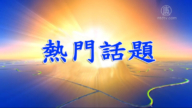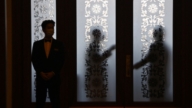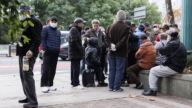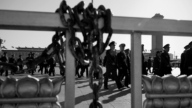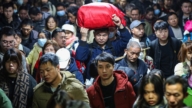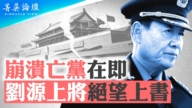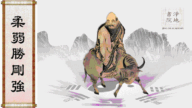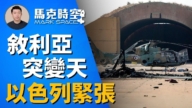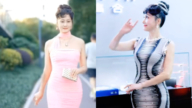【新唐人2013年05月07日讯】中国社会科学院副研究员张明澍,最近出的新书“中国人想要什么样的民主”引发话题。张明澍表示,调查统计的结果,显示中国人的民主观有些出人意外。究竟中国人现在的民主观和80年代发生了什么变化?如何看懂调查数据的意义?来聼专家的解析。
张明澍的新书“中国人想要什么样的民主”,由中国社科院的一个重点科研项目﹕“中国公民政治素质调研”扩展而来。调研根据的是,2011年的调查数据。
张明澍对国内媒体说,调查结果有些让他自己都感到意外——例如,如果以左、中、右划分中国人对民主的看法,偏左,也就是对西方化抵制的人比例较大,占38.1%,中间化立场的占51.5%,偏右的只有占8%。
另外,中立派有一大部分接受主流媒体导向。
不过,张明澍也承认,这次调查比1988年进行的类似调查要谨慎。他对自己的要求是最多贴到体制内的边,不过线。
时事评论员蓝述认为,张明澍的这一顾虑,使得调查问卷的题目,和衡量坐标轴一开始就偏左。按照实际情况,所谓左派的比例应该在30%以下。
原《河北人民广播电台》编辑朱欣欣也认为,目前在中国还无法完全脱离中共因素,客观的做学术调查。
原《河北人民广播电台》编辑朱欣欣:“首先这个民意调查,必须得建立在一个客观的,比较超越党派利益的基础上。应该是一个客观的机构来进行。同时这个调查必须有一定的独立性。不能受某些党派或者是事先的,一定的规定性或者是先入为主的前提。”
蓝述指出,关键要看懂中国社会的左派、右派,和西方社会正好相反。西方高教育程度的群体往往偏左,突破传统。而中国正好相反,偏左的人愿意在体制内、偏右则是要突破,走出体制之外。
不过蓝述认为,调查结果仍然有一定参考价值。
蓝述:“那麽他的调查结果里面显示,知识份子,受教育程度比较高的,他比较靠右。另外就是,越年轻的人,他越靠右。这个调查结果有一定的参考作用,它说明什么呢?就是知识份子和年轻人,他们希望走出这个体制之外。这个东西实际上它代表了这个社会的方向。”
张明澍说,这次他们将认同“民主好不好,要看适不适合中国国情,不能把美国和中国简单比较”的人认定为中间派,但没有做更具体的划分。并且,他凭经验想见,中间派里有一部分人确实是跟着主流媒体走的。
蓝述以2008年贵州瓮安事件举例分析,中间派也是中国人在现行体制下表现出的特有心理。
蓝述:“你看当时瓮安城内,真正去烧县政府大楼,去烧公安局大楼的人也就是不到100人。但是呢,上十万人在那里围观,大家拿着照相机在那里照相觉得解气。这些就属于那些中间派。真正能改变现状的人并不是很多,但绝大多数人,他的这个观望状态,已经表明了他的态度。”
张明澍说,和1988年的类似调查差异很大的是,1988年受调查对像的西方化程度,比现在明显高很多。当时刚改革开放,社会对西方的东西是一种拥抱的态度。
朱欣欣指出,这恰恰证明了政府在这25年间的舆论导向,造成中国人的民主素质无法提高。
朱欣欣:“人们的素质只有在运用自己的权力中,在社会的实践中,才能逐步的提高。你如果不给他创造条件,人们的各方面的能力、素养它不会提高。为什么中国现在从人的素养,从整个新闻自由的环境来讲,是远远落后于世界平均的水平,我们就能看到这一点。”
另外张明澍还表示,调查结果还显示,中国人对政治的期待体现出儒家文化的伦理主意特点。西方人希望用政治来抑恶,而中国人是希望用政治来扬善。
采访/朱智善 编辑/尚燕 后制/李若琳
How Do Today’s Chinese View Democracy?
Zhang Mingshu, associate researcher at the Chinese Academy
of Social Sciences (CASS), has released his new book.
It is titled, “What Kind of Democracy do the Chinese Want?”
Zhang said the survey result was beyond his expectations.
In today’s China, how do the general public
understand democracy?
What changes have occurred, compared to
the people’s democratic expectations of the 1980s?
And how do we comprehend the real meaning
behind the survey? Let’s see what experts have to tell us.
Zhang Mingshu’s new book was based on a survey
on Chinese citizens’ political consciousness.
As a key scientific research project of the CASS,
the survey was conducted in 2011.
Zhang Mingshu told China’s media that
the survey result had surprised him.
For instance, on how to look upon democracy,
38.1% of the Chinese hold a view inclining to the left;
51.5% take middle ground, whilst 8% are right-leaning.
The survey shows that a large part of “the centrists”
are influenced by mainstream media reporting.
Zhang Mingshu revealed that the investigation was
more carefully conducted than a similar one done in 1988.
He said in doing the survey, he didn’t touch the
forbidden zone of the Chinese Communist Party authorities.
Critic Lan Shu says that Zhang’s scruples have influenced
the survey to be left-leaning from the beginning.
Lan Shu believes that the percentage of “the leftist”
is under 30%, based on China’s reality.
Zhu Xinxin, former editor of Hebei state radio station,
comments that in today’s China,
scholars still cannot conduct academic researches objectively,
as they’re partially confined within the CCP system.
Zhu Xinxin: “The poll should mirror objective data.
The survey should be done by an independent organization.
It should be free from any partisan influence.”
According to Lan Shu, the meaning of the “left-wing”
and the “right-wing” in China differs from that in the West.
He says that western people in higher education
usually lean to the left, to break up the convention.
It is just the opposite in China. The left-leaning Chinese
are willing to stay inside the CCP ruling system,
whilst the right-leaning people have tried to
break free of it.
Lan Shu affirms that the survey does have some value.
Lan Shu: “Its result shows that intellectuals are
inclined to the right, so do the young people.
This survey result has consultative value.
It indicates that the intellectuals and youngsters
want to get rid of the communist rule.
This actually mirrors the trend of China’s society.”
“the centrists” as those who agree that
“whether democracy is good or not depends on
if it suits China’s reality, rather than making a
simple comparison between the US and China.”
Zhang said he hadn’t subdivide the group further.
And from an empirical judgment, he believed that
some of the centrists are influenced by mainstream media.
Lan Shu cited an example,
the Weng’an mass protest in Guizhou in 2008.
He says that acting as centrists is an unusual tactic
of the Chinese who are living under the CCP rule.
Lan Shu: “At the protest, only less than 100 people
participated in burning buildings of city hall and police bureau.
But over 100,000 people just acted as onlookers.
There they took pictures with cameras,
feeling the burning vented their anger.
Only a minority took action, but the majority
showed their stance by looking-on at the incidents.”
Zhang Mingshu stated that a similar survey was conducted
in 1988, which greatly differed from the recent one.
He explained that in 1988, the interviewees were
much more western civilized orientated.
It was in the initial stages of the Reform & Opening Up,
when the society embraced western culture.
Zhu Xinxin remarks that this proves that in the
past 25 years, by exerting control over the media,
the CCP regime have impeded the Chinese people’s
democratic views and understanding.
Zhu Xinxin: “People’s ideological aspirations can only be
gradually achieved by exercising their rights in practice.
They wouldn’t improve themselves
if lacking such an environment.
That’s why the Chinese people’s democratic comprehension
are far behind the world average level.”
Reportedly, Zhang Mingshu said that in the survey,
the Chinese people’s political expectations mirrored the Confucian ethics.
In Zhang’s words, the westerners expected to
“curb evil” via politics,
whilst the Chinese hope that
the politics can “promote goodness”.


